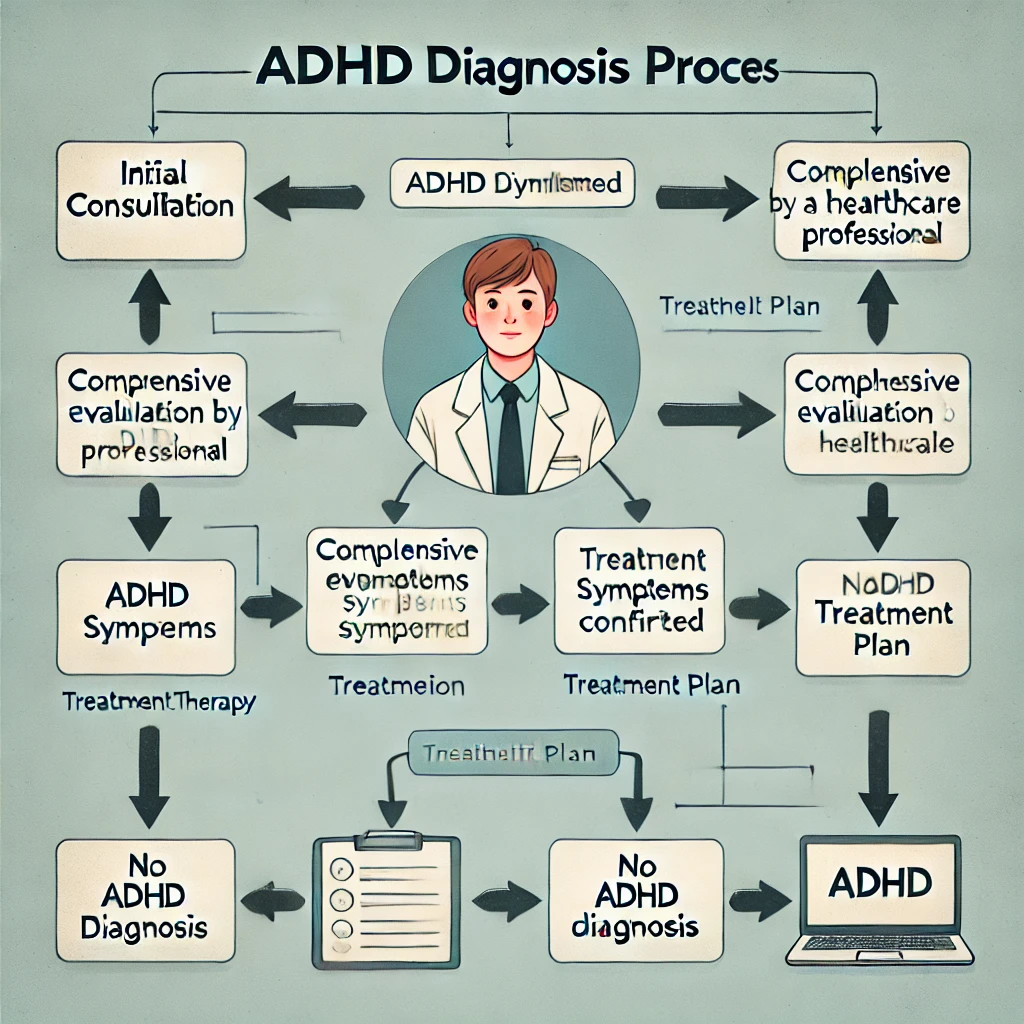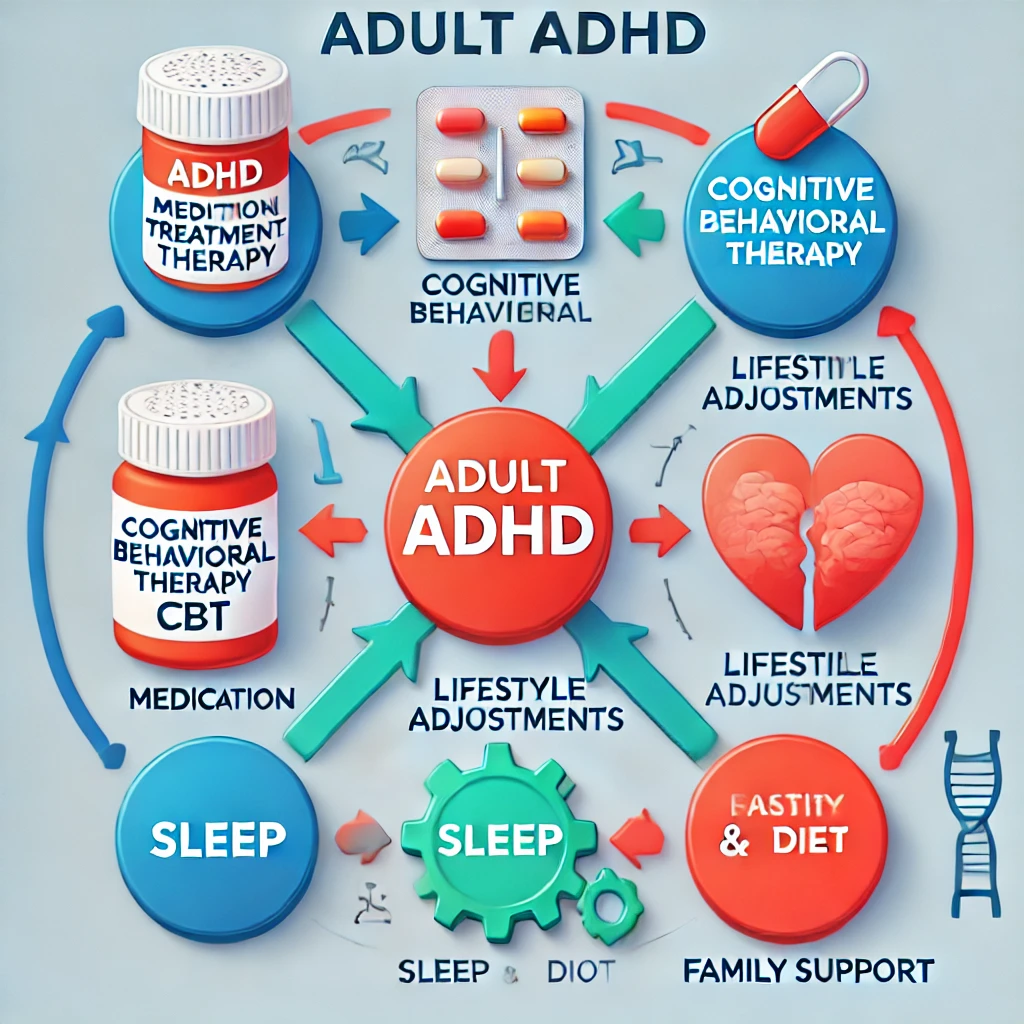Adult ADHD Test is a neurodevelopmental disorder that is often misunderstood or go unnoticed but can have a huge effect on the life of large number of people. ADHD is commonly regarded as a condition of children, but it continues into adulthood in a significant number of cases. Adults with attention deficit hyperactivity disorder may have difficulty maintaining their attention, acting impulsively and being hyperactive, but these symptoms tend to present differently than they do in children. Simplified Path To Adult ADHD Diagnosis and Treatment: This blog will explain in detail the simple way of how to diagnose and treat adult ADHD in the best way possible, devoid of any confusion or difficulties.
Diagnosing adult adhd is a process that requires gathering information in steps and takes into consideration the individual’s symptoms, history and whether there are any other conditions that may be present. Here is a simple sequence of the diagnostic voyage:
Step 1: Identifying Adults with Risk Factors for adhd
Screening: The first step in adult ADHD diagnosis is identifying individuals at risk. Adults at risk frequently experience ongoing difficulties with the ability to manage time, maintain focus, organize tasks, and control impulses. These struggles often hit less interruptible how it affected their personal relationships and the way they view the world. Risk factors include a history of untreated childhood ADHD, family history of the condition and trouble adapting to high-pressure situations.
Step 2: Gathering Complete Background Information
After a patient has been classified as high risk, clinicians will obtain extensive background information. Such records spanning these fields include medical history, educational performance, behavioral observations, and personal accounts of daily challenges. Clinicians rely on standardized tools, including the Adult adhdTest, are commonly used to measure symptom intensity and patterns. They assist the clinician in distinguishing ADHD from other potential conditions, including anxiety or depression, that can share similar symptoms.
Step 3: Carrying Out a Comprehensive Diagnostic Interview
The diagnostic interview is a very important step when clinicians gain a deeper insight into the life experiences of the individual. In the process, they examine the onset and duration of the symptoms, assess the effect on daily functioning, and analyze coping methods adopted over time. Clinicians must create a full picture with accuracy in diagnosis.
Step 4: Identification and Management of Comorbid Conditions
ADHD is seldom an isolated condition. Adults with ADHD often have comorbidities like anxiety disorders, depression, or substance use disorders. Diagnosis of these conditions is an important aspect of the diagnostic process since they complicate treatment or mask ADHD symptoms. An integrated approach ensures that both ADHD and any associated conditions are addressed properly for maximum benefit.

Successful treatment of adult ADHD demands a multimodal treatment strategy individualized to the patient’s needs. This section describes the main treatment modalities that exist.
Proper Utilization of Medications for ADHD in Adults
Medications frequently form the foundation of ADHD treatment. Stimulants, including methylphenidate and amphetamines, are most frequently used and are remarkably effective in addressing fundamental symptoms of inattention and impulsivity. Non-stimulant medications like atomoxetine also exist for individuals who do not tolerate stimulants or do not want traditional treatments.
Proper medication management involves regular follow-ups to monitor efficacy and side effects, ensuring the treatment remains effective and safe over time.
Though medication works, non-medication approaches are important for dealing with the overall issues faced by ADHD. Cognitive Behavioral Therapy (CBT) is most useful for adults since it teaches them day-to-day tactics for time management, emotion control, and becoming more organized.
Other treatments, like mindfulness training and ADHD coaching, offer long-term gains through promoting self-knowledge and problem-solving ability.
Each adult with ADHD is different and requires customized plans for management. These management plans usually incorporate medication, therapy, and lifestyle changes to suit the varied difficulties encountered by adults with ADHD. With individualized treatment, clinicians can produce more successful and long-term results.
Behavioural therapy addresses the reshaping of habits and the establishment of positive routines. It is most effective in conjunction with lifestyle adjustments like regular physical exercise, keeping a balanced diet, and having adequate sleep. These changes contribute not only to the management of ADHD but to overall health as well.
Beyond the diagnostic and treatment process, adult ADHD has far-reaching implications for individuals’ personal and professional lives. Addressing these aspects is critical for comprehensive care. Beyond the diagnostic and treatment process, adult ADHD has far-reaching implications for individuals’ personal and professional lives. Addressing these aspects is critical for comprehensive care.
Family support is also an important factor in the success of ADHD treatment. Informing family members about the condition enables them to offer constructive support and encouragement. This mutual effort creates a supportive environment where individuals feel supported and empowered. For those seeking additional help, Family Psychotherapy NJ can be a valuable resource in providing structured therapy sessions to strengthen family dynamics and improve overall support for individuals with ADHD.
Adult ADHD tends to impact interpersonal relationships and work performance. Communication, time management, and task completion problems can strain relationships and interfere with career advancement. Treating these problems with therapy and work accommodations can make a major difference.
Stigma is still a deterrent to diagnosis and treatment for most adults with ADHD. Raising awareness and disseminating accurate information about the disorder can help society make it a more accommodating place for affected individuals.
ADHD treatment is not a single event but rather an ongoing process. Frequent follow-ups with Tema Therapy professionals enable constant evaluation and modification of treatment strategies. This helps individuals continue to flourish as their situations and requirements change.
Recent advancements in research have created new treatment methods and diagnostic tools for adult ADHD. Technologies like neurofeedback and digital therapeutics are breaking open the menu of possibilities and bringing hope to more effective, more accessible treatment.
Adult ADHD understanding necessitates the acknowledgment of its intricacies and tackling its challenges through proper diagnosis and individualized treatment. The takeaways are:
By adopting a holistic approach, individuals with ADHD can lead fulfilling lives while effectively managing their condition.

Tema Therapy providers must enter the care of ADHD with ethical integrity and openness. Overcoming bias and ensuring equal access to treatment are important to improve ADHD awareness and treatment.
Gratitude goes to researchers, clinicians, and activists who work tirelessly to improve knowledge, diagnosis, and treatment of adult ADHD, leading to better outcomes and greater awareness. Their dedication helps reframe ADHD from a challenge to an opportunity for growth and self-discovery. Initiatives focused on ADHD Testing NJ play a crucial role in early identification and intervention, empowering individuals to understand their unique traits and develop effective coping strategies. This shift in perspective fosters self-acceptance, enabling those with ADHD to recognize their strengths and navigate daily life with confidence.
440 West Street, Suite 323, Fort Lee, NJ, 07024
[email protected]
Phone: (347) 879 0202
Copyright © 2025 | All Rights Reserved | Created By Invisio Solutions Ltd